

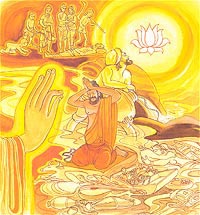 |
Verse 383. Be A Knower Of The Deathless
Explanation: Exert all you can and cut off the stream of existence. Get rid of passion. Get to know the erosion of the condition things. And, they become the knower of the uncreated - Nibbana. |
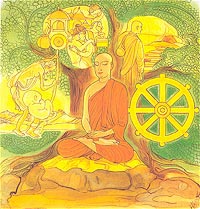 |
Verse 384. Cultivate Concentration
Explanation: When the brahmana - the seeker after the truth - has understood the two states of concentration and insight through and through, then in that person who knows these, all fetters wane, diminish and fade away. |
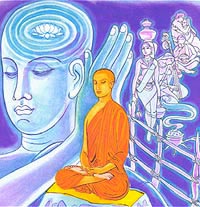 |
Verse 385. The Unfettered Person Is A Brahmana
Explanation: To him there is no further shore. To him there is no near shore. To him both these shores are non-existent. He is free of anxiety and is freed of bonds. That person I describe as a Brahmana. |
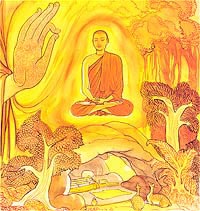 |
Verse 386. Who Is Contemplative And Pure Is A Brahmin
Explanation: He is given to concentrated contemplation. He is free of all blemishes - the dust that defiles a being. He sits in solitude. All his spiritual tasks and obligations are done. He has reached the highest goal. That person I describe as a brahmana. |
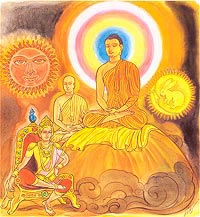 |
Verse 387. The Buddha Shines Day And Night
Explanation: The sun shines during the day. The moon beams at night. The warrior glows only when he has his armour on. The brahmana shines when he is concentrated on contemplation. All these people have various times to shine. But the Buddha is radiant all day and all night through his Enlightenment. |
 |
Verse 388. He Who Had Discarded All Evil Is Holy
Explanation: One who has got rid of sinful action is called brahmana. One of serene senses is called samana. A person is called pabbajita because he has done away with all his faults. Note: brahmano, samano, pabbajito: a brahmin, a monk a wandering ascetic. These are all categories of priests in the religious landscape of the Buddha’s day. They pursued a multitude of religious paths. Here the Buddha explains who a real priest, monk or a brahmin is. |
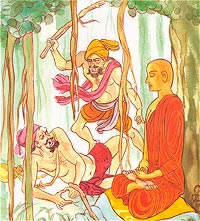 |
Verse 389. Harm Not An Arahat
Explanation: No one should strike a brahmana - the pure saint. The brahmana who has become a victim must refrain from attacking the attacker in return, or show anger in return. Shame on him who attacks a brahmana; greater shame on him who displays retaliatory anger. |
 |
Verse 390. An Arahat Does Not Retaliate
Explanation: To the brahmana, the act of not returning hate is not a minor asset - it is a great asset, indeed. If, there is in a mind which usually takes delight in hateful acts, there is a change for the better, it is not a minor victory. Each time the violent mind ceases, suffering, too, subsides. |
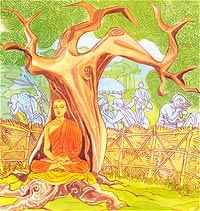 |
Verse 391. The Well-Restrained Is Truly A Brahmin
Explanation: If an individual is well guarded in body, speech and in mind, and has done no wrong in these three areas, who is well restrained, I call that person a true brahmana - the noble saint. |
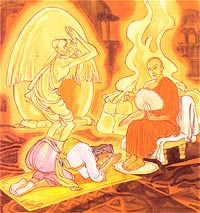 |
Verse 392. Honour To Whom Honour Is Due
Explanation: If a seeker after truth were to learn the Word of the Enlightened One from a teacher, that pupil must pay the Teacher due respect, like a brahmin paying homage assiduously and with respect to the sacrificial fire. |
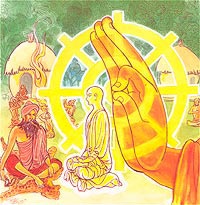 |
Verse 393. One Does Not Become A Brahmin Merely By Birth
Explanation: One does not become a brahmin by one’s matted hair. Nor does one become a brahmin by one’s clan. Even one’s birth will not make a brahmin. If one has realized the Truth., has acquired the knowledge of the Teaching, if he is also pure, it is such a person that I describe as a brahmin. |
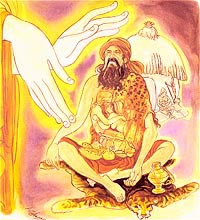 |
Verse 394. Be Pure Within
Explanation: Of what use are your exterior sights of asceticism: you matted hair, your leopard skin garment? Your outside you keep clean and bright, while inside you are filled with defilements. |
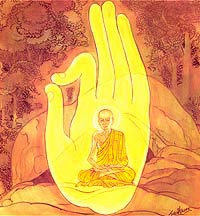 |
Verse 395. Who Meditates Alone in the Forest Is A Brahmana
Explanation: He wears robs made of cast off rags. He is so austere and lean that veins stand out in his body. All alone, he meditates in the forest. Such a seeker if truth, I describe as a brahmano. |
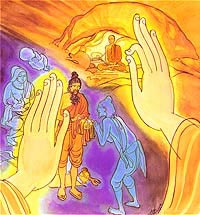 |
Verse 396. Non-Possessive And The Non-Attached Person Is A Brahmana
Explanation: I would not call a person a brahmana merely because he was born out of a brahmana mother’s womb. Nor would I call a person a brahmin merely because he goes about addressing people as sir. These people are full of defilements. I call a person a brahmin who is free of faults and is not given to craving. |
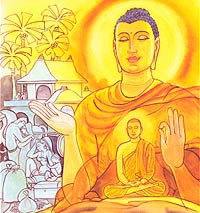 |
Verse 397. A Brahmana Is He Who Has Destroyed All Fetters
Explanation: He has got rid of all fetters; in consequence, he is free of trepidation and is fearless. He has travelled beyond all bonds. Disengaged from bonds, he is no longer tied to the world. Such a person I describe as a brahmana. |
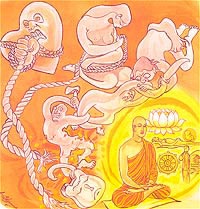 |
Verse 398. A Brahmana Is He Who Has No Hatred
Explanation: He has got rid of the strap of ill-will. He has freed himself from the thong of craving. He has escaped the large shackle breaking all its links. These are the false views that curb the people. He has taken off the cross-bar of ignorance. He has become aware of the four noble truths. That person, I describe as a brahmana. |
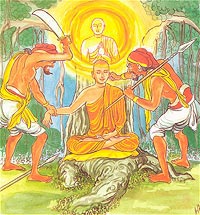 |
Verse 399. A Brahmana Is He Who Is Patient
Explanation: He is abused and insulted. He is tortured, imprisoned and bound up. But he endures all these without being provoked or without losing his temper. Such an individual who has patience as his power and his army, I describe as a true brahmano. |
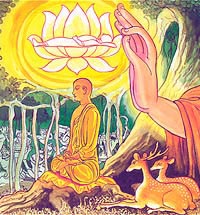 |
Verse 400. A Brahmana Is He Who Is Not Wrathful
Explanation: He is free of anger. He carefully performs his religious duties and is mindful of the observances. He is disciplined in terms of virtuous behaviour. He is restrained. This is the final body he will occupy as he has ended his cycle of births. I call that person a brahmana. |
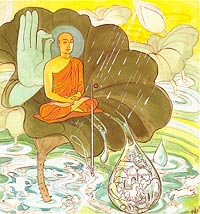 |
Verse 401. He Is A Brahmana Who Clings Not To Sensual Pleasures
Explanation: The water does not get attached to the surface of the lotus leaf. The mustard seed does not get attached to the point of a needle. In the same way, the wise one’s mind does not get attached to sensual pleasure. Such a non-attached person I describe as the true brahmana . |
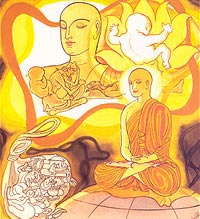 |
Verse 402. A Brahmana Is He Who Has Laid The Burden Aside
Explanation: He has become aware, in this world itself, the end of suffering. He is unburdened: he has put down the load. He has got disengaged from the bonds that held him. I call that person a true brahmana. |
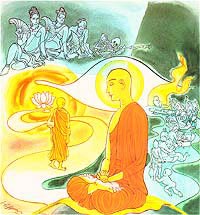 |
Verse 403. A Brahmana Is He Who Has Reached His Ultimate Goal
Explanation: He possesses profound wisdom. He is full of insight. He is capable of discriminating the right path from the wrong path. He has reached the highest state. I call that person a true brahmana. |
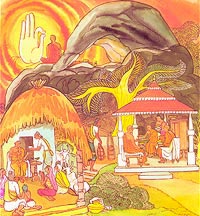 |
Verse 404. A Brahmana Is He Who Has No Intimacy With Any
Explanation: He does not establish extensive contact either with laymen or with the homeless. He is not attached to the way of life of the householder. He is content with the bare minimum of needs. I call that person a true brahmana. |
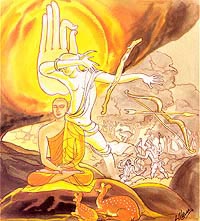 |
Verse 405. A Brahmana Is He Who Is Absolutely Harmless
Explanation: He has discarded the rod and set aside the weapons. He does not hurt neither the frightened, timid beings, nor stubborn, fearless beings. I call that person a brahmana. |
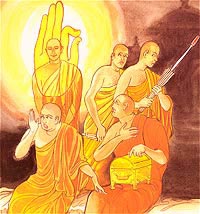 |
Verse 406. A Brahmana Is He Who Is Friendly Amongst The Hostile
Explanation: Being friendly even among the hostile. Free from hostility, violence and passionate grasping, one emerges a true brahmin. |
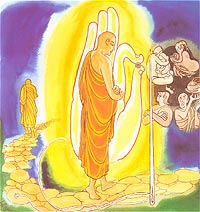 |
Verse 407. A Brahmana Is He Who Has Discarded All Passions
Explanation: His mind does not accept such evils as lust, ill-will, pride and ingratitude. In this, his mind is like a point of a needle that just does not grasp a mustard seed. An individual endowed with such a mind I describe as a brahmana. |
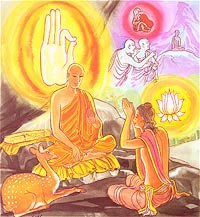 |
Verse 408. A Brahmana Is He Who Gives Offence To None
Explanation: His speech is true. His words are well-meaning, constructive and not harsh. By his words he will not give offence to anyone. Nor will his words provoke people. Such a person I declare a true brahmana. |
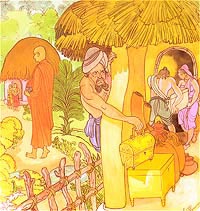 |
Verse 409. A Brahmana Is He Who Steals Not
Explanation: In this world if there is some person who does not take anything that is not given, whether long or short, minute or large or good or bad, him I declare a true brahmana. |
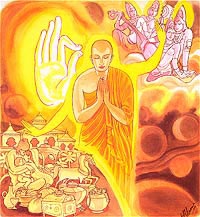 |
Verse 410. A Brahmana Is He Who Is Desireless
Explanation: He has no yearnings either for this world or for the next. He is free from earning and greed. He is disengaged from defilements. Such a person I declare a fine brahmana. |
 |
Verse 411. In Whom There Is No Clinging
Explanation: He has no attachments - no attachments can be discovered in him. He has no spiritual doubts due to his right awareness, He has entered the deathless - Nibbana. I describe him, a true brahmana. |
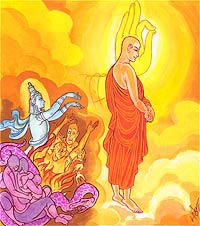 |
Verse 412. Above Both Good And Evil
Explanation: If any person in this world has travelled beyond both good and the bad, and the attachments, and if he is without sorrow, and is bereft of blemishes, and is pure, him I describe as a true brahmana. |
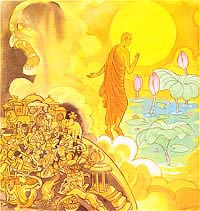 |
Verse 413. Learning The Charm
Explanation: He is like the moon at the full - spotless and free of blemishes. He is pure, calm, serene and exceptionally tranquil. He is has got rid of the craving that takes delight in the cycle of existence. That person I declare a true brahmana. |
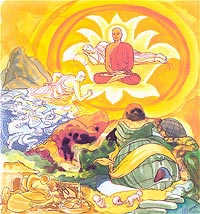 |
Verse 414. The Tranquil Person
Explanation: He has crossed over the quagmire of passion. He has gone beyond the difficult terrain of blemishes, that is hard to traverse and has crossed the cycle of existence. He is fully and totally reached the other shore. He is a meditator and is bereft of craving. His spiritual doubts are resolved. He is no longer given to grasping. He is cooled. Such a person I describe as a true brahmana. |
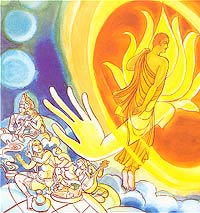 |
Verse 415. Freed From Temptation
Explanation: Rejecting pleasure, homeless he goes to life’s journey’s end. Him, I call a Brahmin True. |
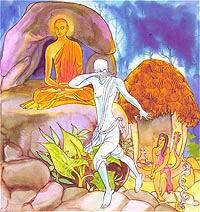 |
Verse 416. The Miracle Rings
Explanation: In this world, he has taken to the life of a wandering ascetic. He has got rid of the craving to continue the cycle of existence. I describe that person as a true brahmana. |
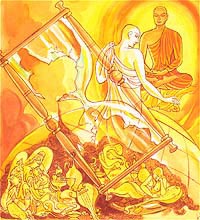 |
Verse 417. Beyond All Bonds
Explanation: He has given up the bonds that bind him to humanity. He has gone beyond the bonds of attachment to life in heaven as well. This way, he is disengaged from all bonds. I declare such a person a brahmana. |
 |
Verse 418. The Person Whose Mind Is Cool
Explanation: He has given up lust. He has also given up his disgust for the practice of meditation. This way, he is both lustful and lustres. He has achieved total tranquillity. He is devoid of the blemishes that soil the hand. He has conquered all the world and is full of effort. I call that person a brahmana. |
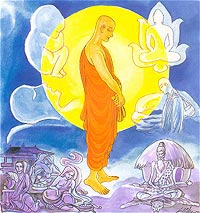 |
Verse 419. Diviner Of Rebirth
Explanation: He knows the death and birth of beings in every way. He is not attached to either birth or death. He has arrived at the proper destination. He possesses the knowledge of the essences. This person I describe as a brahmana. |
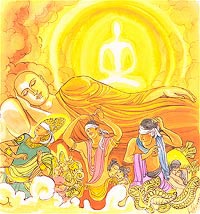 |
Verse 420. Destroy Unknown
Explanation: Their path, neither gods, nor spirits, nor humans can fathom. Their taints are totally eradicated. They have attained the higher spiritual state. This person I declare a brahmana. |
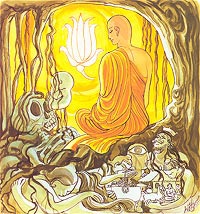 |
Verse 421. He Yearns For Nothing
Explanation: Their path, neither gods, nor spirits, nor humans can fathom. Their taints are totally eradicated. They have attained the higher spiritual state. This person I declare a brahmana. |
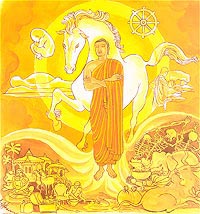 |
Verse 422. He Who Is Rid Of Defilements
Explanation: He is a great sage as he has realized the essentials. He has conquered death. He is devoid of blemishes. He has washed away all evil. He has awakener to the essentials. That person, I describe as a brahmana. |
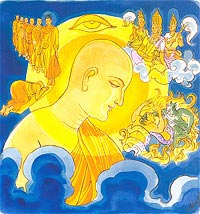 |
Verse 423. The Giver And Receiver Of Alms
Explanation: He knows his former existences. He has the capacity to see heaven and hell - states of ecstasy and states of woe. He has ended the cycle of existences. He has his higher awareness. He has reached the state of a sage. He has achieved the final perfection. Him I describe as a brahmana. |
| |
|
|
| |
|
|
| |
|
| |
|
|
|
|
|
|
|